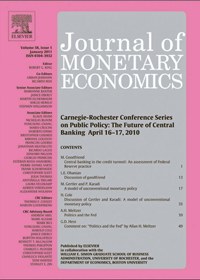
Huo, Z. and Pedroni, M. (2023). Dynamic information aggregation: Learning from the past Journal of Monetary Economics, 136:107--124.
-
Affiliated author
-
Publication year2023
-
JournalJournal of Monetary Economics
With dispersed information, how much can agents learn from past endogenous aggregates such as prices or output? In a rational-expectations equilibrium, if general equilibrium effects are strong enough, aggregates no longer perfectly reveal underlying fundamentals. In this confounding regime, the effects of informational frictions are persistent over time, and the aggregate outcome displays an initial under-reaction followed by a delayed over-reaction relative to its perfect-information counterpart. In a standard New Keynesian model, we show that endogenous information aggregation helps bring the model predictions on aggregate forecasts closer to the data.